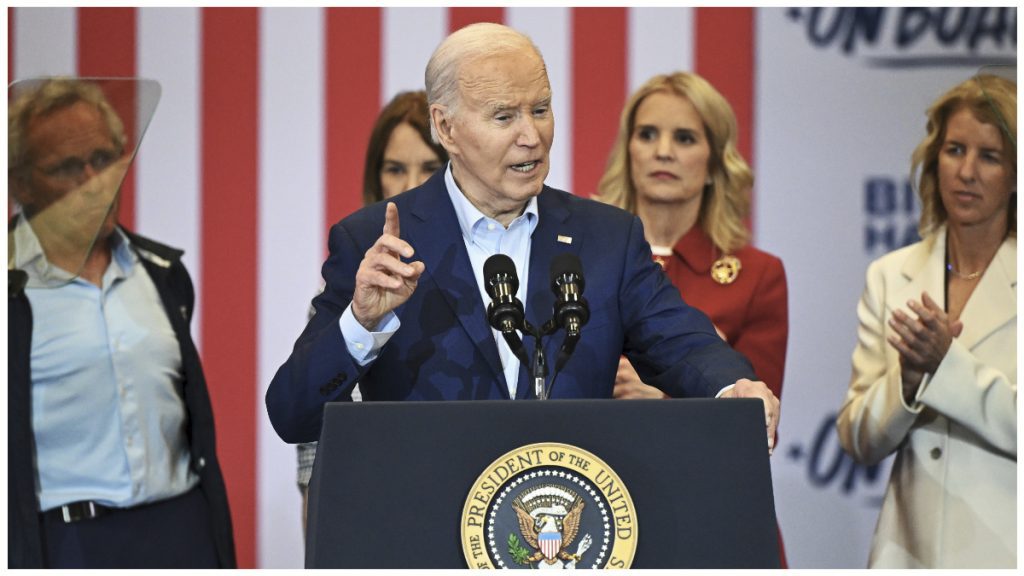President Joe Biden is facing criticism for suggesting his “Uncle Bosie” was eaten by cannibals.
Biden shared the story on April 17 in Avoca, Pennsylvania, according to a transcript from the White House. He was talking about his uncle, Ambrose J. Finnegan, who died during World War II.
While Biden did not explicitly say his “Uncle Bosie” was eaten by cannibals, he mentioned cannibals being active in New Guinea at the time his uncle’s plane was shot down there, and added, “They never recovered his body.”
The Guardian interviewed experts in New Guinea who criticized Biden’s cannibal claim as “unsubstantiated” and “poorly judged.”
“The Melanesian group of people, who Papua New Guinea is part of, are a very proud people,” said Michael Kabuni, a lecturer in political science at the University of Papua New Guinea, to The Guardian. “And they would find this kind of categorisation very offensive. Not because someone says ‘oh there used to be cannibalism in PNG’ – yes, we know that, that’s a fact.”
He added: “But taking it out of context, and implying that your [uncle] jumps out of the plane and somehow we think it’s a good meal is unacceptable.”
Here’s what you need to know:
President Joe Biden Stated That His ‘Uncle Bosie’ Was Shot Down in a Region With Many Cannibals’
“I wanted to see where my uncle, Ambrose J. Finnegan, was memorialized. And there was a World War Two memorial built for those who lost their lives in World War Two,” Biden began the remarks.
“And when D-Day occurred, the next day, on Monday, all four of my mother’s brothers went down and volunteered to join the military. And four of them — three of them made it. One was 4-F — couldn’t go,” he said.
“And Ambrose Finnegan — we called him ‘Uncle Bosie’ — he — he was shot down. He was Army Air Corps before there was an Air Force. He flew single-engine planes, reconnaissance flights over New Guinea,” Biden said. “He had volunteered because someone couldn’t make it. He got shot down in a region where there were a lot of cannibals in New Guinea at the time.”
He added, “They never recovered his body. But the government went back, when I went down there, and they checked and found some parts of the plane and the like.”
According to CNN, when asked about Biden’s cannibal account, Deputy Press Secretary Andrew Bates told the network: “President Biden is proud of his uncle’s service in uniform, who lost his life when the military aircraft he was on crashed in the Pacific after taking off near New Guinea.”
Fox News correspondent Pete Doocy questioned White House spokeswoman Karine Jean-Pierre about the cannibal claim. She responded that people should not make jokes about it.
Doocy: “Why is [Biden] saying his Uncle was eaten by cannibals?”
Jean-Pierre: “Let’s not make jokes about this.”
Doocy: “President Biden said it.”
Jean-Pierre: “Your line is for a laugh, for a funny statement.”
The Defense Department Page on Ambrose Finnegan Does Not Mention Cannibals But Does Say the Body of ‘Uncle Bosie’ Was Never Recovered
The U.S. Defense Department page on the fate of Finnegan does not mention cannibals.
On May 14, 1944, an A-20 havoc (serial number 42-86768) with three crew members and one passenger left Momote Airfield, Los Negros Island, for a courier flight to Nadzab Airfield, New Guinea. For unknown reasons, this plane had to land in the ocean off the north coast of New Guinea.
Both engines failed at low altitude, and the plane's nose hit the water hard. Three men did not come out of the sinking wreck and were lost in the crash. One crew member survived and was saved by a passing barge. An aerial search the next day found no trace of the missing aircraft or the lost crew members,
Second Lieutenant Ambrose J. Finnegan joined the U.S. Army Air Forces from Pennsylvania and served in Headquarters, Fifth Air Force. He was the passenger on this Havoc when it was lost. He has not been linked with any remains recovered from the area after the war and is still unaccounted-for. Today, Second Lieutenant Finnegan is remembered on the Walls of the Missing at the Manila American Cemetery in the Philippines.
Kabuni told The Guardian that some communities did practice cannibalism, such as consuming a deceased relative out of respect to prevent their body from decomposing.
There was a context. They would not simply eat any white men who fell from the sky,



